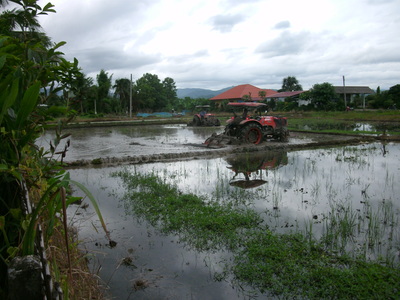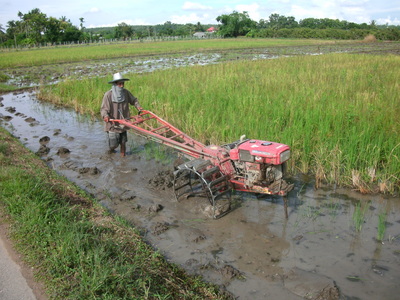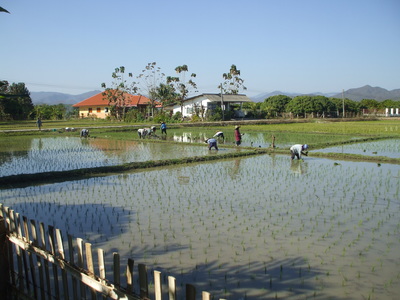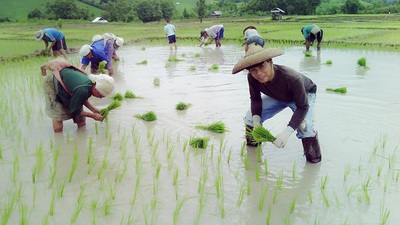|
RICE PLANTING is in full swing in our valley. The rainy season is officially here on this weekend after Asanha Bucha Day. It is the beginning of Buddhist lent. The tradition says that the Lord Buddha instructed his disciples to stay in their monasteries during the rainy season in order to keep from traipsing across rice fields damaging the newly planted crop. This, we are told, was a very compassionate precaution.
Rice is the main food of Thailand as well as the main export product. In the late 19th century HM King Chulalongkorn, Rama V, mandated the expansion of Central Siam’s irrigation canal system. This opened up large tracks of land for rice farming. The produce far exceeded domestic need so an agri-industry developed to buy farmers’ excess rice and ship it abroad. Soon rice export values surpassed teak, up to then the main source of foreign exchange. With the development of reservoirs, a second rice crop became possible. Faster transportation expanded agricultural export possibilities to include fresh fruit and flowers. Advanced processing capacity has opened still more options to include soy oil, corn oil and corn meal, palm oil, coconut oil and canned, dried, pickled and candied fruit, especially oranges, pineapples and lameyes. Farming has grown from a seasonal occupation to a full-time, year-round possibility. Slowly, farmers have eased into the lower middle class, but in vast numbers. Even though the “middle-men” still work less, take fewer risks and make more profit, laborers have increasing expendable income and clout. The sheer bulk of the agriculture-based, laboring, lower-middle class has nearly leveled the balance of power between clients and patrons. The elite and those in the upper middle class still have control but they are hanging onto it more nervously. Rice production methods are an excellent example of how the change has come. I am watching the evolution from my windows overlooking rice fields and orchards. This year, large (well, middle-size) tractors with roto-till plows were used on our rice fields for the final plowing. Just a year ago transitional technology was used. (see: www.kendobson.asia/blog/how-now-to-plow) A few years ago water buffalo pulled the plows. That by-gone age was non-mechanical, muscle-powered, intimate, hands-on farming. The transitional era replaced muscle-power with motor driven plows, still guided by hand by farmers walking behind. Farmers called their machines “metal buffaloes”. This was still hands-on farming with the farmer in intimate contact with the soil, knee deep in mud. But in the emerging, current era the tractor driver sits above the mud piloting a machine, pulling levers while the farmer stands on the side of the field and watches, waiting to pay for having the field plowed. The only foreseeable technological advance would be robotic tractors directed by humans from a distance or entirely by computer. This is not, I think, the direction development will take. If agribusiness elsewhere is any indication, growth will be in terms of size of fields and equipment rather than computerization. But rice planting still generally includes an age-old aspect. The transplanting of rice seedlings is still done by hand, knee deep in mud. Broadcasting seeds onto a field reduced to slurry is not yet popular here in the North. As long as rice needs to be transplanted from seed beds into plowed fields it will be hands-on. When the fields become large enough to eliminate the transplant-phase the farmers will no longer own their land and will begin to grow distant from the production of their own food supply, and ours. The emphasis will shift away from a balance of tradition and common sense to maximized production without regard for impact on consumers or the environment. At the same time the annual agricultural cycle will fade in importance to villagers as it has for metropolitan dwellers, and culture and religion will change.
0 Comments
Leave a Reply. |
AuthorRev. Dr. Kenneth Dobson posts his weekly reflections on this blog. Archives
March 2024
Categories |
| Ken Dobson's Queer Ruminations from Thailand |
|




 RSS Feed
RSS Feed
